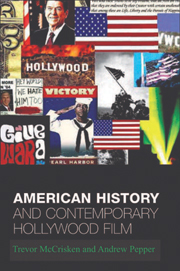Book contents
- Frontmatter
- Contents
- Acknowledgements
- Preface
- Introduction
- 1 Lessons from Hollywood's American Revolution
- 2 Rattling the chains of history: Steven Spielberg's Amistad and ‘telling everyone's story’
- 3 Hollywood's Civil War dilemma: to imagine or unravel the nation?
- 4 Saving the Good War: Hollywood and World War II in the post-Cold War world
- 5 Oliver Stone and the decade of trauma
- 6 From Civil Rights to Black Nationalism: Hollywood v. black America?
- 7 Hollywood's post-Cold War history: the ‘righteousness’ of American interventionism
- Select Bibliography
- Index
5 - Oliver Stone and the decade of trauma
Published online by Cambridge University Press: 05 August 2013
- Frontmatter
- Contents
- Acknowledgements
- Preface
- Introduction
- 1 Lessons from Hollywood's American Revolution
- 2 Rattling the chains of history: Steven Spielberg's Amistad and ‘telling everyone's story’
- 3 Hollywood's Civil War dilemma: to imagine or unravel the nation?
- 4 Saving the Good War: Hollywood and World War II in the post-Cold War world
- 5 Oliver Stone and the decade of trauma
- 6 From Civil Rights to Black Nationalism: Hollywood v. black America?
- 7 Hollywood's post-Cold War history: the ‘righteousness’ of American interventionism
- Select Bibliography
- Index
Summary
More than any other American film director in recent years, Oliver Stone has looked to American history for his inspiration and subject matter. In doing so, he has also attracted greater controversy and passionate criticism than any of his contemporaries. The plaudits and condemnations come almost in equal measure. Stone is praised by some historians for advocating ‘a strong thesis about the meaning of the past’ and presenting a ‘powerful interpretation of contemporary American history’. Some have even claimed that he is ‘the most influential historian of America's role in Vietnam’. Yet other historians deem Stone's renderings of historical subjects ‘disgraceful’ or a ‘disaster’. As such, he has been accused of an ‘arrogant distortion of the historical record’ that amounts to the ‘rape of US history’.
Stone has gone to great lengths to try to answer his critics by writing articles, op-ed pieces and letters, conducting interviews with historians, appearing at academic conferences, publishing referenced film scripts and contributing to an academic book assessing his work. In recent years he has insisted that he is not a historian. Nor, despite the beliefs of some critics, has he ever claimed to be one. Instead, Stone sees himself as a ‘historical dramatist’ in the tradition of the Greeks and William Shakespeare. He argues that he mixes fact and fiction in his work in attempts to reveal larger ‘truths’ about recent American history and to challenge the often comfortable narratives and conclusions of traditional American historians.
- Type
- Chapter
- Information
- American History and Contemporary Hollywood Film , pp. 131 - 159Publisher: Edinburgh University PressPrint publication year: 2005

